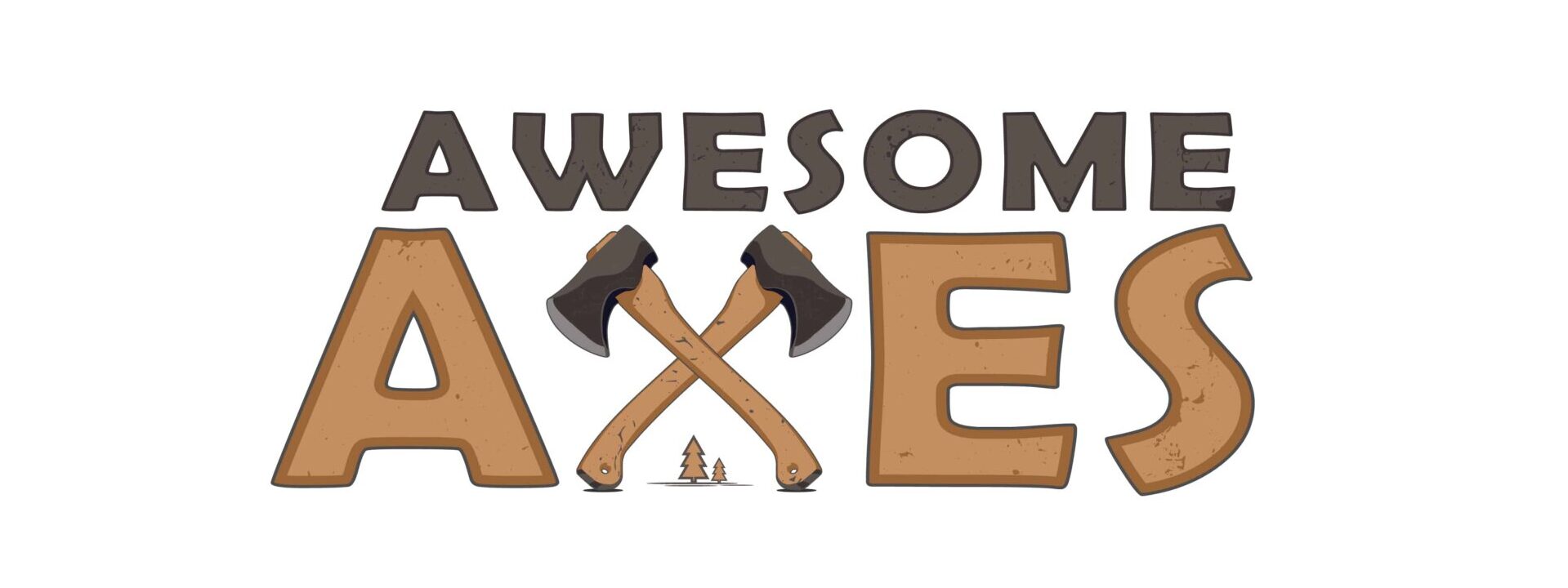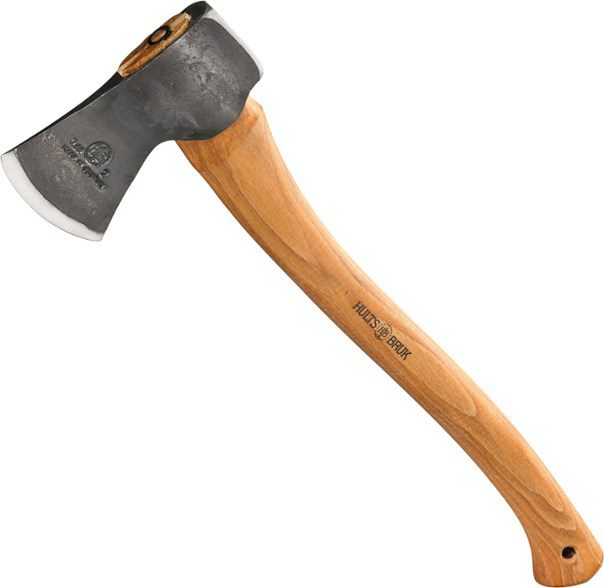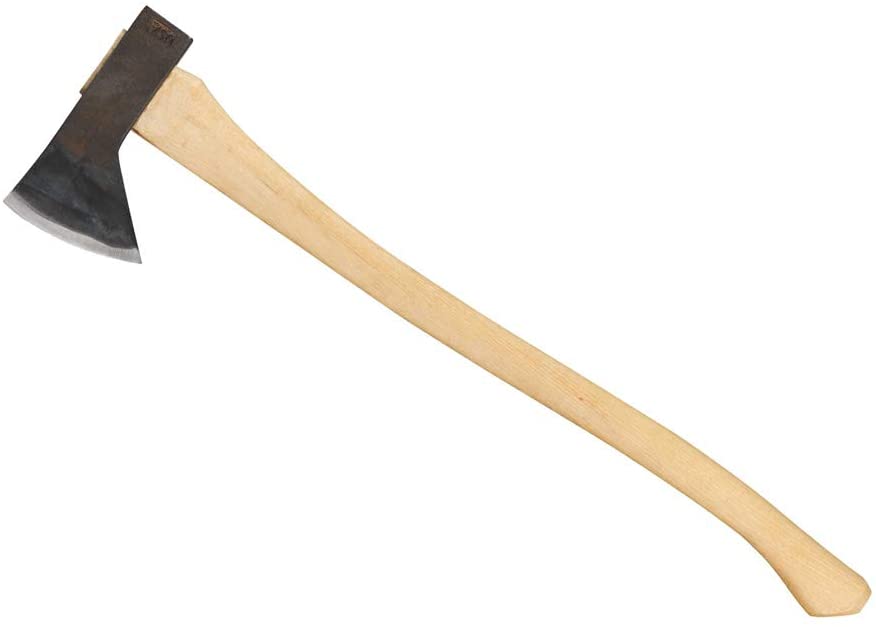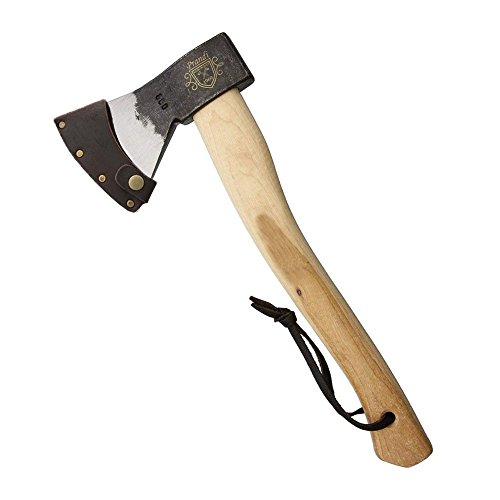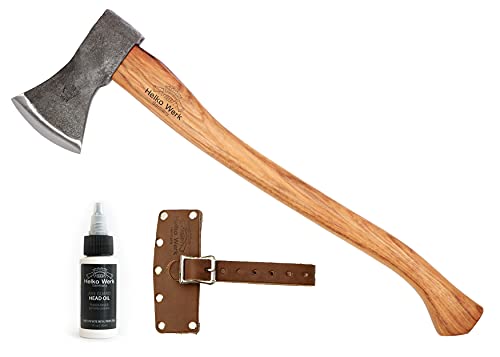The best bushcraft axes are between 18 and 24 inches long and weigh between 1.5 and 2.5 pounds. They are lightweight enough to transport easily but powerful enough to chop down full-sized trees.
The Hults Bruk Aneby is my top choice because of its versatility as an all-purpose camping and bushcrafting axe. It features a hand-forged Swedish axehead with a 3.5-inch heat treated edge. It is ideal for bushcrafting and backpacking for chopping firewood, felling small trees, hunting, and clearing brush.
Bushcrafting and going into the woods is hundreds of years old and closely and brightly linked to the national histories of North America. Going into the woods for a couple of days or weeks is growing in popularity, especially now with more people getting out of cities and going into the great outdoors. A good axe is an essential bushcraft tool, so this is an in-depth review list of the best bushcraft axes for the money.
- Total Weight - 2.75 pounds
- 2.0 Pound Solid Swedish Steel Axehead
- 20 inch American Hickory Handle
- Ideal for Bushcrafting and Camping
Council Tool Hudson Bay Camp Axe
- 24 inch Hickory Handle
- Forged Steel Head
- Made in USA
- Hand Sharpened
- 24 inch Hickory Handle
- Fine Grain Steel
- Long 4 Inch Cutting Edge
- Leather Blade Sheath Included
Table of Contents
1. Hults Bruk Aneby
First up is the Hults Bruk Aneby, a 20-inch, 2-lbs (axehead weight, total weight 2.75 lbs) all-purpose camp and bushcraft axe. This is the cream of the crop of bushcraft axes, a true “Goldilocks” axe that is neither too long or too short, too heavy or too light for the tasks you’d mostly be doing while bushcrafting and backpacking.
Carefully hand-forged in the Hults Bruk forge in Sweden, the Aneby will – despite its size – go through even tough hardwoods. Its 3.5-inch cutting edge is heat-treated and hardened well, so it’ll hold a sharp edge for a long time (and it comes razor-sharp straight out of the box).
The axehead itself is high-quality Swedish carbon steel – the precise details are proprietary information, but the Swedes – and especially the big two axemakers, one of which is Hults Bruk – are known for making great steel.
The profile of the bit is narrow, so it’s a good cutting axe and bites deep, but it’s not as narrow as a felling axe would be and is thus also good for splitting small pieces of wood for firewood. You can use the poll to pound wooden stakes for a tent (don’t strike metal with it!), and since the edges of the poll are slightly rounded you can even use it to help detach the hide from large game, without fear of angular edges damaging the skin.
It has a hole drilled at the bottom of the American hickory handle, which is useful if you want to thread a reflective lanyard through it.
Pros
- High-quality Swedish carbon steel axehead
- American hickory handle
- Well designed for portability
Cons
- Higher priced than most bushcraft axes
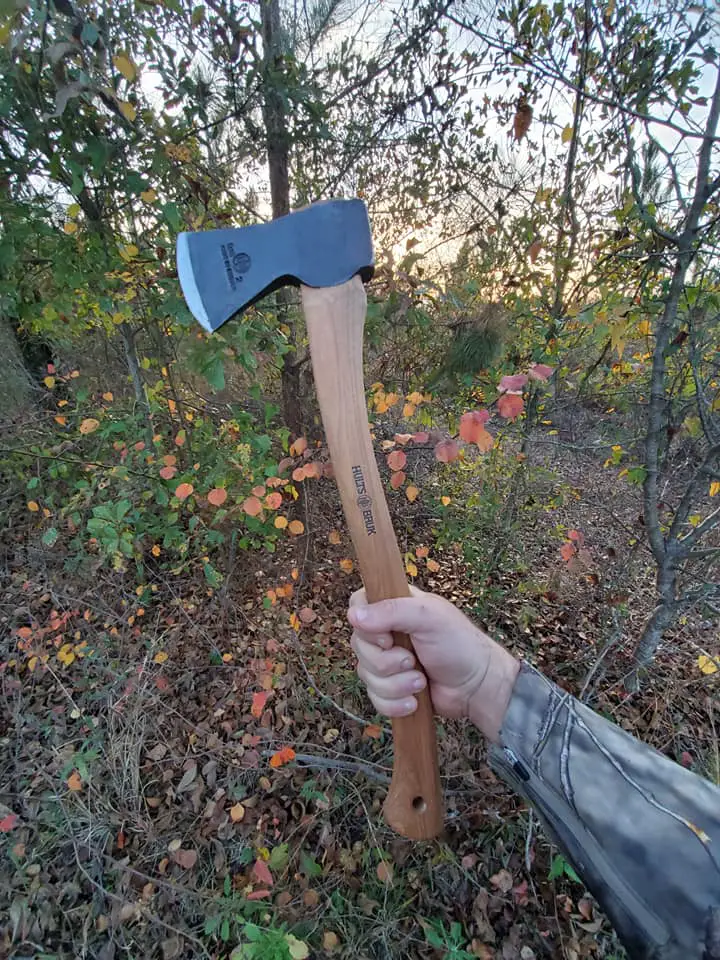
2. Council Tool Hudson Bay Axe
The Council Tool Hudson Bay axe is an American-made axe with a historical design – one that’s been around since the colonial days of the Hudson Bay Trading Company and woodsmen working the fur trade.
The 2-pound axehead is mounted on a 24-inch American hickory handle, and has everything you need from a bushcraft axe. The two-foot handle allows for more forceful swings, allowing you to cut down medium-sized trees and split larger logs more easily than you would be able to with 20” or smaller axes.
The axehead is 5160 grade alloy steel, and the bit is heat treated and tempered approximately an inch from the cutting edge for maximum edge retention – its hardness is between 52-56 HRC. You can comfortably grip and swing this axe with two hands, but it’s not a heavy full-size axe by any means.
It would be great for trail clearing, delimbing trees, processing wood for firewood. The CT Hudson Bay axe comes with a complementary leather sheath, which is always nice for extra protection against the elements (mostly moisture).
This is from the Velvicut Premium Line, so it’s a cut above the regular Council Tool axes, comes very sharp straight out of the box, but is also more expensive.
If you’re looking for something affordable but also American-made, check out the next axe from Council Tool but at a considerably lower price point.
Pros
- Made in Amerca
- 5160 grade alloy steel
- Heat treated cutting edge
- American hickory handle
Cons
- 24-inch handle is more difficult to fit in your backpack
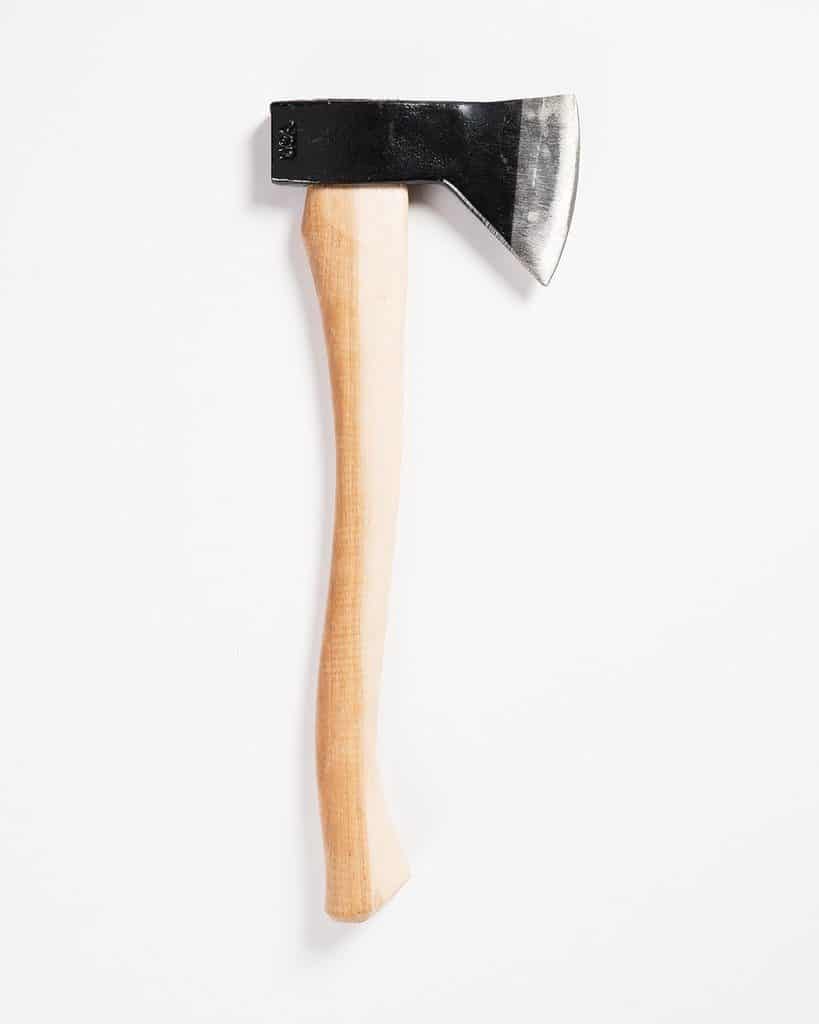
3. Council Tool Boy’s Axe
The Council Tool Boy’s Axe is another great bushcraft axe with a head that is ¼ of a pound heavier than the Hudson Bay axe and with a less pronounced beard. It’ll be good for felling small and medium-sized trees, splitting wood for a campfire, and other tasks out in the bush.
Otherwise, it’s quite similar to the Hudson Bay model – 24” handle. And, as with all Council Tool axes, it’s made in the USA.
Pros
- Made in America
- American hickory handle
Cons
- It is heavier than the already less maneuverable Hudson Bay Axe
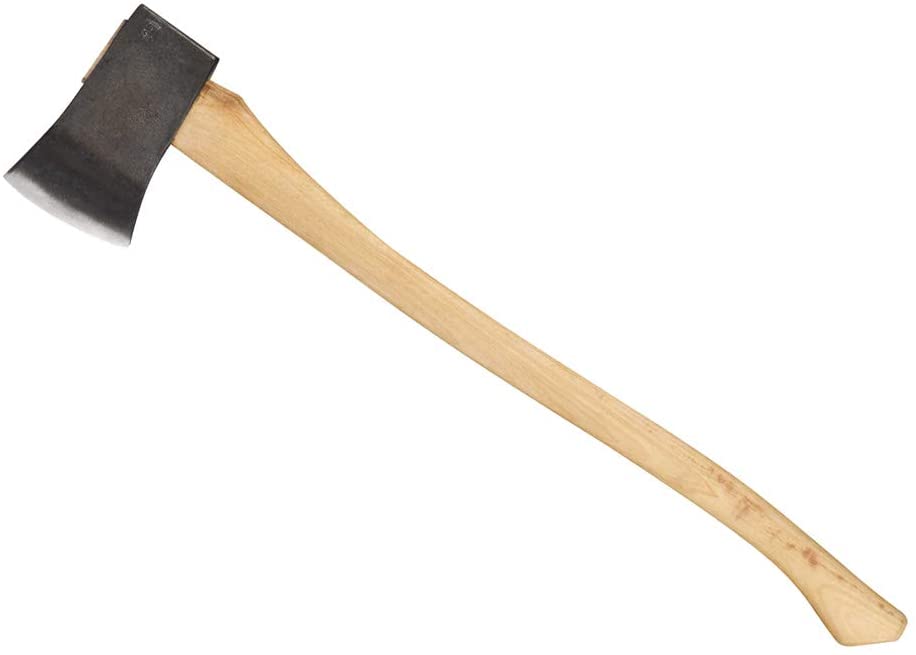
4. Snow and Neally Hudson Bay
The Snow and Neally Hudson Bay axe is a lighter version of the Council Tool Hudson Bay. The axehead weighs 1 ¾ lbs, while the handle is 24 inches long. This axe is great if weight (less of it) is important to you – whether you’re walking a lot or carrying a lot into the bush. It’ll serve you well when felling small trees or saplings for building a shelter, delimbing fallen trees, and other light tasks around camp.
If you’re looking to do serous chopping and splitting, you might want something with a heftier axehead – such as the Boy’s Axe mentioned above. The Snow and Neally Hudson Bay axe comes with a genuine leather sheath, which is always good for extra safety and protection from the elements.
Pros
- Easy to travel long distances
- Versatile for multiple tasks
Cons
- While the lighter weight is more portable, it lacks the power to fell smaller trees
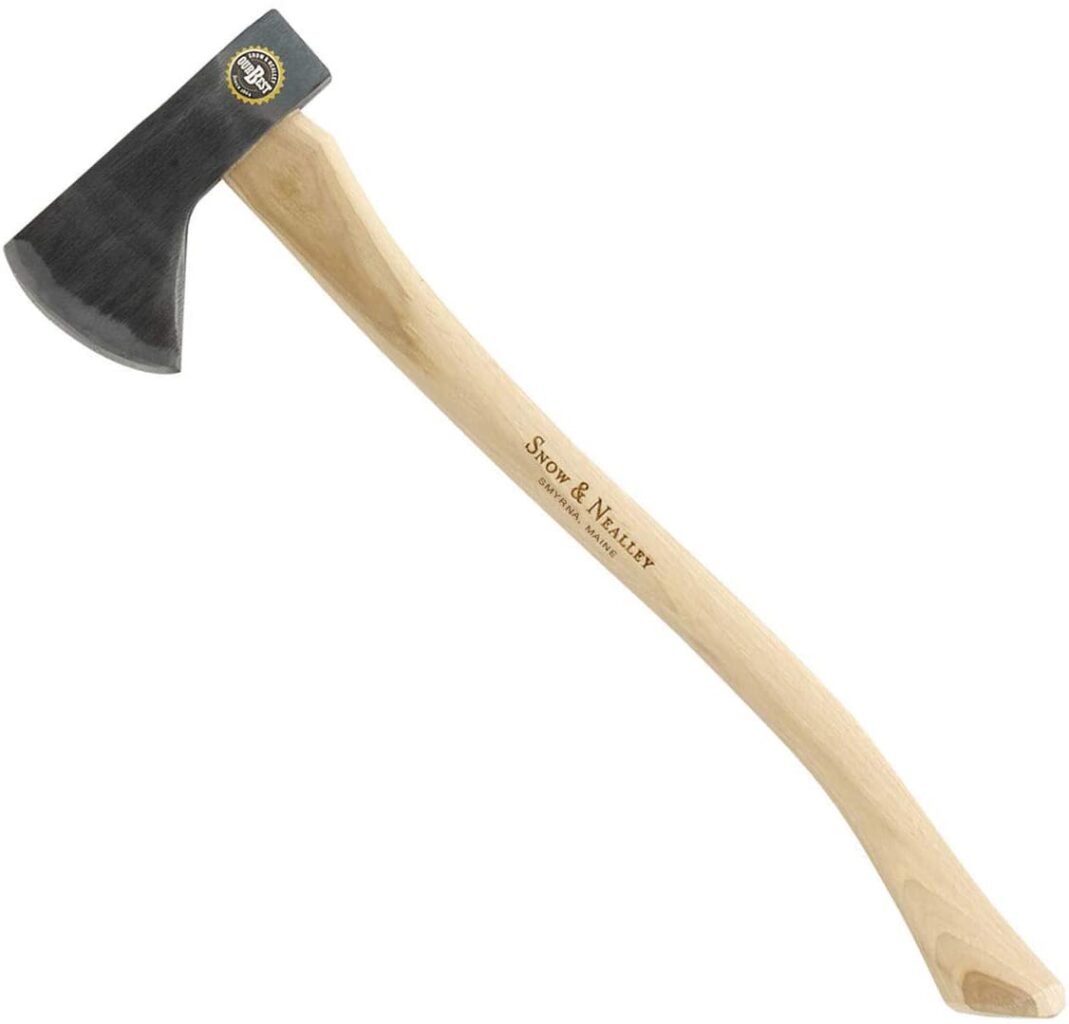
5. Estwing Double Bit Axe
The Estwing Double Bit axe is a hefty beast as all Estwing axes are. That’s because it’s all metal, a single piece of steel. This makes it practically unbreakable. The handle is quite short – about 17 inches – and weighs 38 ounces or 2.3 pounds.
The double bit design is great because it allows you to do different things with each cutting edge. One can be used for “clean” work, such as cutting small trees or delimbing, while the other side can be used for “dirty” work – splitting wood that is placed on the ground, clearing out roots in your camp area, going through bones of animals you’ve hunted – that you wouldn’t do with a regular single-bit axe because it would dull the edge quite quickly.
The Estwing has a shock reduction grip (good for your wrists and arm joints) and a ballistic nylon sheath to make carrying and handling safer. Made in the USA.
Pros
- Short handle is very portable
- Shocked reduction handle
- Made in America
Cons
- You lack the ability to generate a lot of power with a 17-inch handle
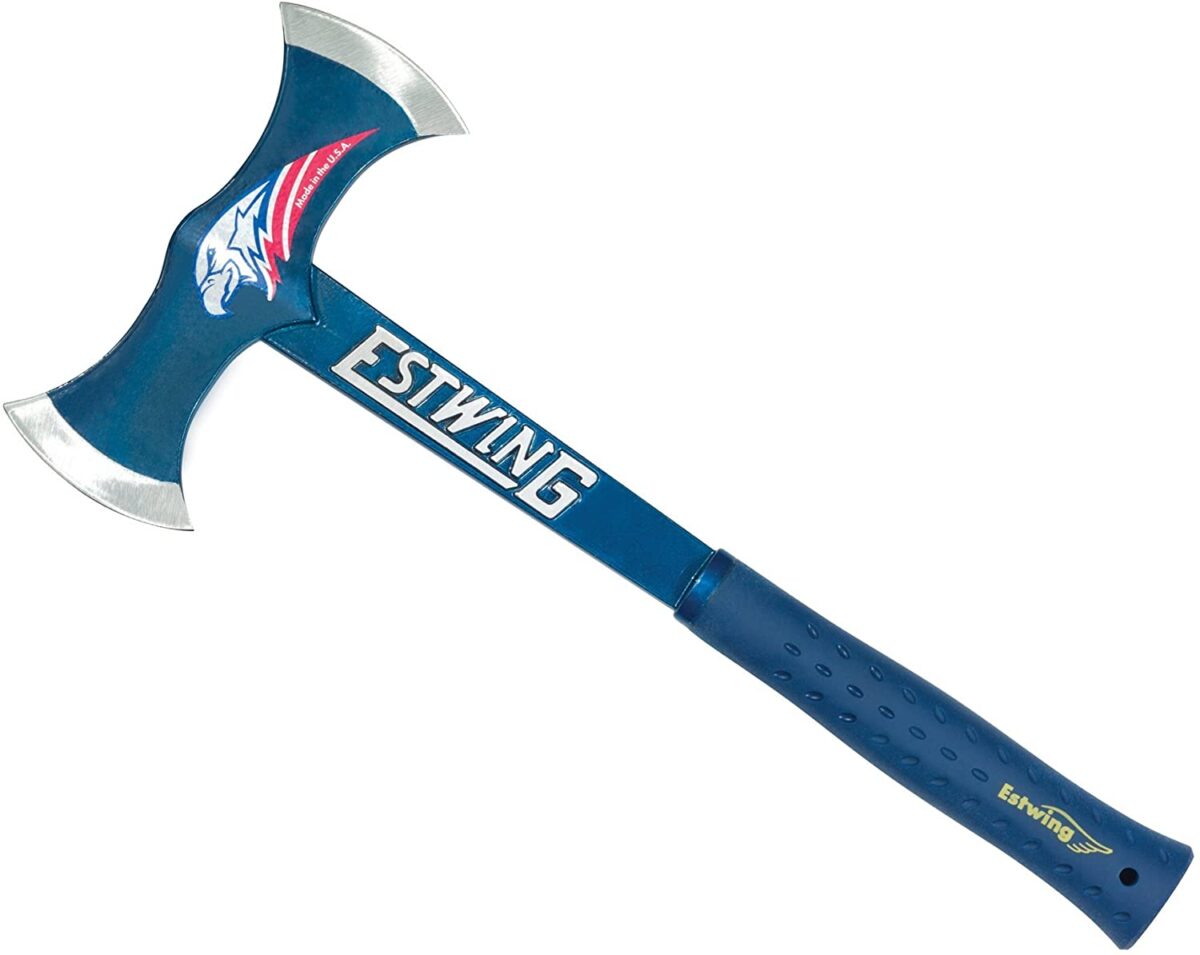
6. Estwing Camper’s Axe
The Estwing Camper’s axe is a single-bit full-tang axe that is a great choice if you never want your axe to break in the middle of a bushcrafting trip. The handle is 16 inches long and it has a 4-inch cutting edge, so this is more of a hatchet than a decent-sized axe, but its full-metal construction means you can whack away at almost anything and not have to worry about the axehead coming off of the handle.
The patented shock reduction grip – made of a composite material – also claims to reduce impact vibrations by 70%. Whatever the true number, the handle greatly reduces the shock to your wrists and arm joints, which is good news for anyone, but especially the people for whom that’s an issue. Basically, your arm and shoulder will be less tired and sore after using the Estwing Camper’s axe than would be the case with other steel-handled axes that don’t have such a shock reduction grip.
Finally, the handle being metal means that severe cold won’t weaken it – unlike fiberglass and even wood-handled axes, which tend to weaken when conditions are below freezing. The axe comes with a ballistic nylon sheath that is light and easy to open and close.
Estwing also make a 26-inch version of the camper’s axe, which you can check out if you like the idea of an all-metal axe with a longer handle. Made in the USA.
Pros
- Portable 16-inch handle
- Shocked reduction grip
Cons
- The shorter handle lacks the ability to fell small trees due to its lower power generation
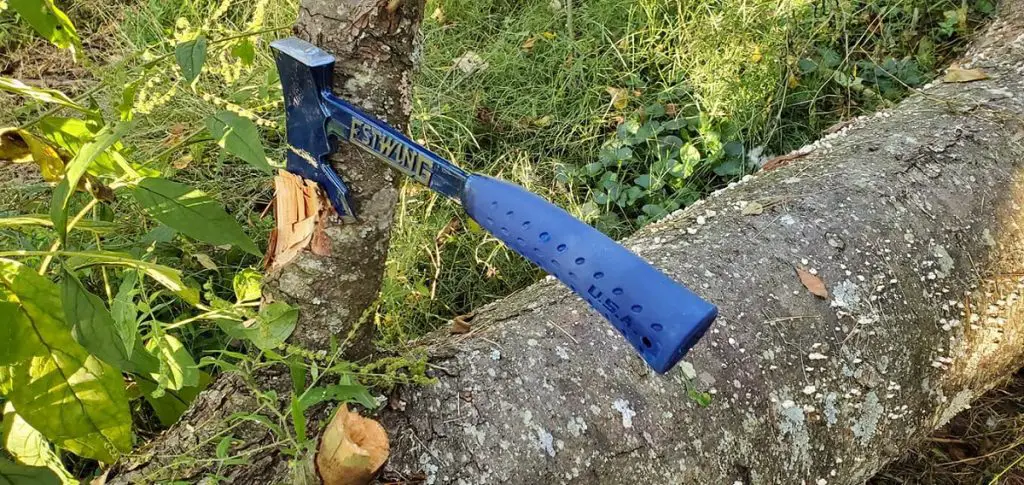
7. Marbles Hunters Axe
The Marbles Hunter’s axe is a budget axe made by a company with a long history of axe and other tool production. It has an overall length of 18 inches (so the hickory handle is an inch or two shorter) and a 3.5 inch cutting edge. The steel is 1045 carbon, and the end of the handle has a hole drilled into it to thread paracord or something similar through.
It’s a no-frills axe, and when it arrives you’ll probably have to sharpen it. That’s because the manufacturer doesn’t know if it’s going to a warehouse or a hardware store and so, for safety reasons (children or clumsy customers), they don’t make them razor sharp before shipping. In any case, that’s only a few minutes of work with a sharpening stone. Made in El Salvador.
Pros
- 1045 carbon steel axehead
- Hickory handle
Cons
- It lacks the construction quality of the American and Swedish axes
- You will need to sharpen it immediately
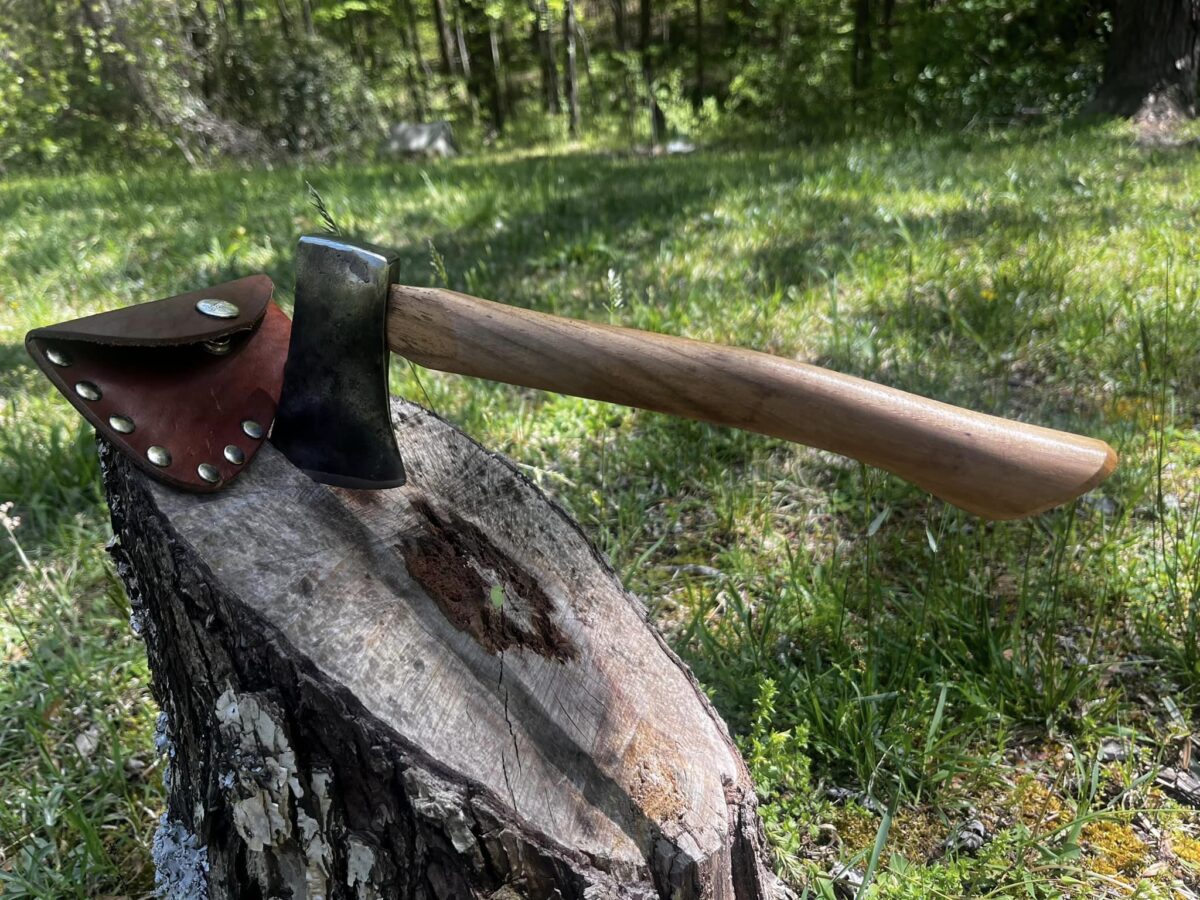
8. Gerber Freescape Hatchet
Gerber is the US version of the Fiskars brand, made by the same manufacturer, but marketed under a different brand name. Fiskars are known for their high-quality tools at a very affordable price, and the Gerber Freescape hatchet is no exception.
At 17.5 inches handle length, the Freescape hatchet is on the smaller side. But it’s light and very sturdy due to the design and construction, with the handle molded around the axehead, so it won’t be flying off anytime soon. The composite handle makes the axe lighter than other similar-sized hatchets.
The axe bit is coated with PTFE, which reduces friction and lessens your axe will get stuck in wood. Finally, the sturdy plastic sheath allows for safe carrying when not in use.
If the price is higher than usually (possible when stocks are low), I recommend looking at the Lexivon V18 axe, which is very similar in design and has received good reviews as well.
Pros
- Friction reducing coating applied to the axe head prevents it getting stuck in the wood
- Lightweight design is easy to carry
- Robust composite handle
Cons
- The main problem with composite handles is that if it breaks you have to throw the entire axe away
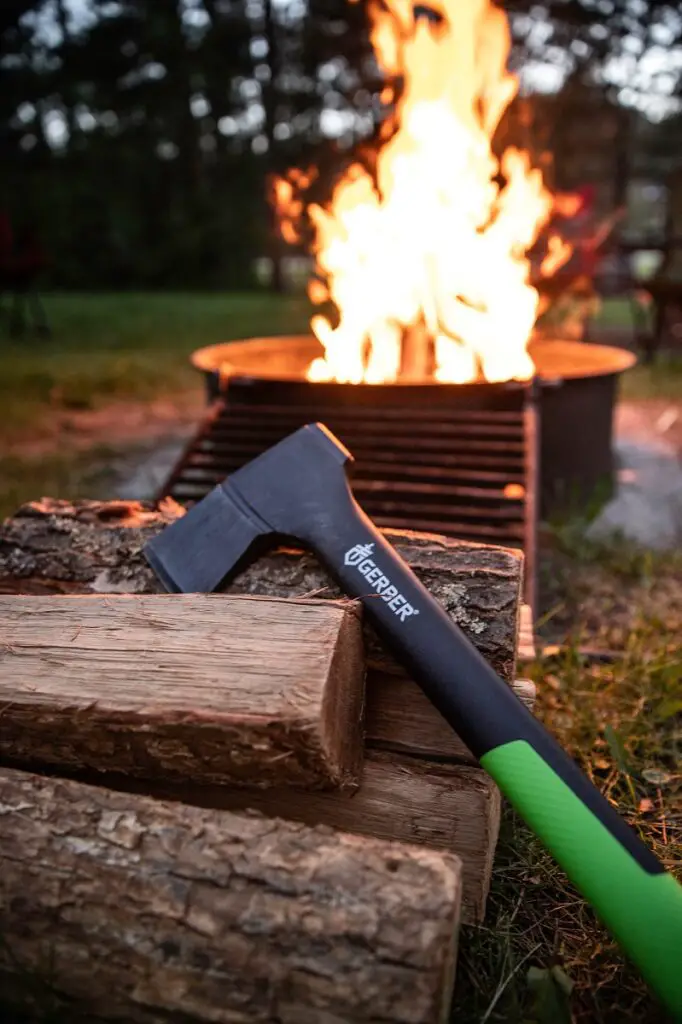
9. Husqvarna 26” Multi-Purpose Axe
Husqvarna are best known for their chainsaws, but this Swedish company is owned by the same group – Hultafors – that produce Hults Bruk axes, some of the best in the world. The Husqvarna 26-inch multi-purpose axe is an excellent bushcrafting axe, long enough for heavier work, but light enough (3 lbs overall weight) to carry around.
A few years ago they had some problems with the design, with the steel breaking where the Husqvarna symbol was stamped into the axehead (which is reflected in reviews). Still, recent information indicates that this design flaw has been fixed. Made in Sweden.
Pros
- Affordable version of the higher quality Swedish axes
- A nice balance between power and portability
Cons
- The 26-inch handle is unlikely to fit in your backpack and will need to be carried directly
10. Husqvarna 24” Composite Multi-Purpose Axe
The Husqvarna 24-inch composite multi-purpose axe is a slightly smaller version of the 26” multi-purpose axe, that has a composite handle. This is a very good choice for bushcrafters as well, as the composite handle means that it is lighter than comparably-sized axes with wooden or metal handles.
Pros
- Composite handle is lighter and easier to carry
Cons
- The main problem with composite handles is that they can’t be replaced if they break
11. Snow and Neally Outdoorsmans Belt Axe
The Snow and Neally Outdoorsmans Belt axe is a small (14.5 inch handle, 1 ¼ lbs) hatchet with a 3 ⅛ inch cutting edge. Made in Smyrna, Maine as all Snow and Neally axes are, this is a great little hatchet with an excellent American steel (1080) axehead. It comes with a sturdy and roomy, but not loose leather sheath.
Pros
- 1080 American Steel
- Lightweight and portable – ideal for bushcraft
- Made in America
Cons
- Snow and Neally are a premium brand and come with a premium price tag
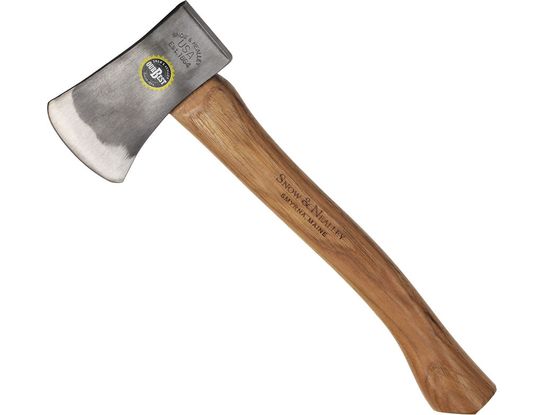
12. Prandi German Style Hatchet
Prandi are an Italian firm that have been making axes since 1969. The Prandi German Style hatchet is a heavy little thing – with the axehead weighing 28 ounces (800 grams) it’s heavier than many standard-sized 20-ounce hatchets to be found in the USA.
However, the heavier axehead with the wide cutting edge allows for deeper bites into wood, which is welcome if you’re trying to fell small trees or remove medium-sized branches. The C45/1045 high carbon steel will hold a very sharp edge. Made in Italy.
Pros
- Made from C45/1045 high carbon steel
- Allows you to generate more power
Cons
- Heavier than alternate hatchets
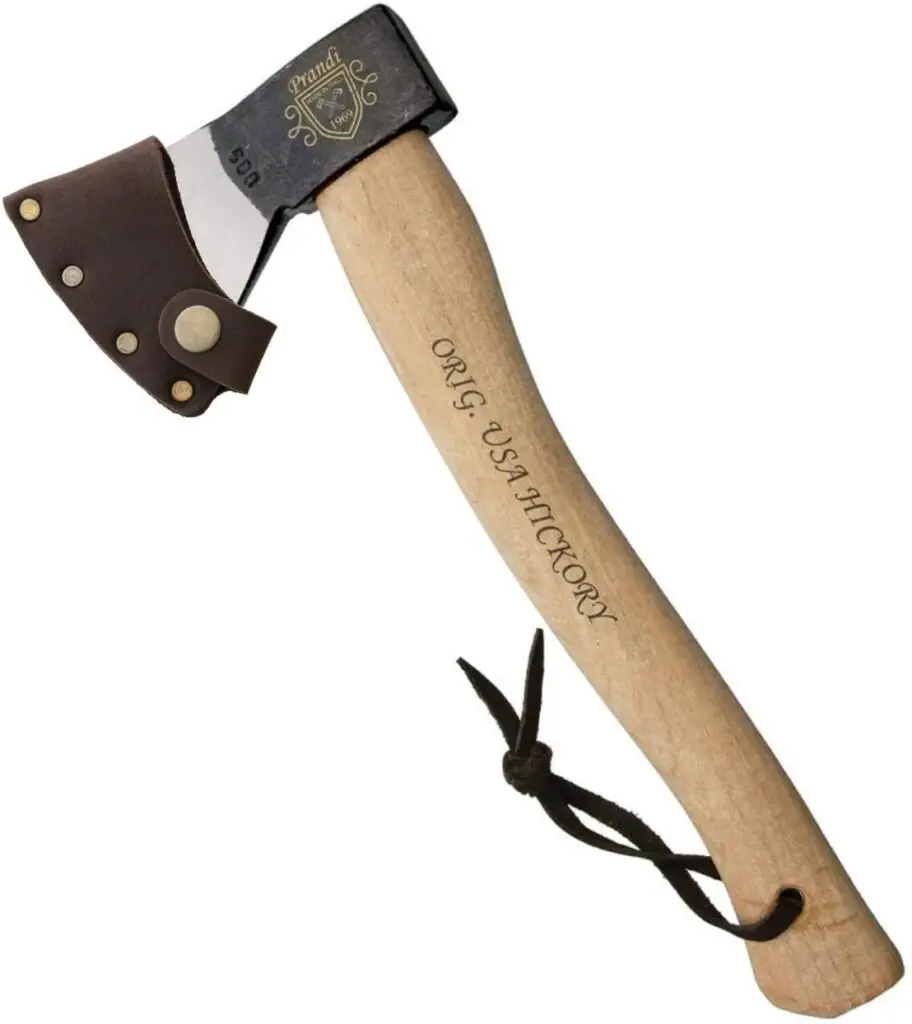
13. 1844 Helko Werk Black Forest Woodworker Axe
Finally, rounding off this list – last, but not least! – is the Helko Werk Black Forest Woodworker axe. The 2 ¼ pound axehead, 24-inch American hickory handle, and C50 high carbon steel of 53-56 HRC hardness make this a very versatile and effective axe for a lot of tasks – felling small-to-medium sized trees, saplings, splitting firewood, and more. It’s big enough for larger tasks such as trail clearing, bucking a tree, or delimbing medium-sized branches.
The premium German design and forging of the axehead, quality of the steel, and excellent balance make handling it a joy, easy in the grip and swing. While it doesn’t come cheap you also get what you pay for in a very good way.
The axehead is attached to the handle with the usual wooden wedge, after which comes a notched steel ring wedge for extra grip and tight, snug fit.
The Black Forest Woodworker axe also comes with a full-grain leather sheath and an ounce of axe guard oil to store it in. The second is especially welcome since many axes come with sheaths, but axe guard oil is great you apply if you’re out in a potentially wet environment.
Since the steel is high carbon, you should take care of it and the axe guard oil is a nice touch from the manufacturer. German pragmatism and quality once again!
Pros
- Made from C50 high carbon steel axehead
- Includes a full grain leather sheath and guard oil
Cons
- More expensive price tag, but it will last a lifetime
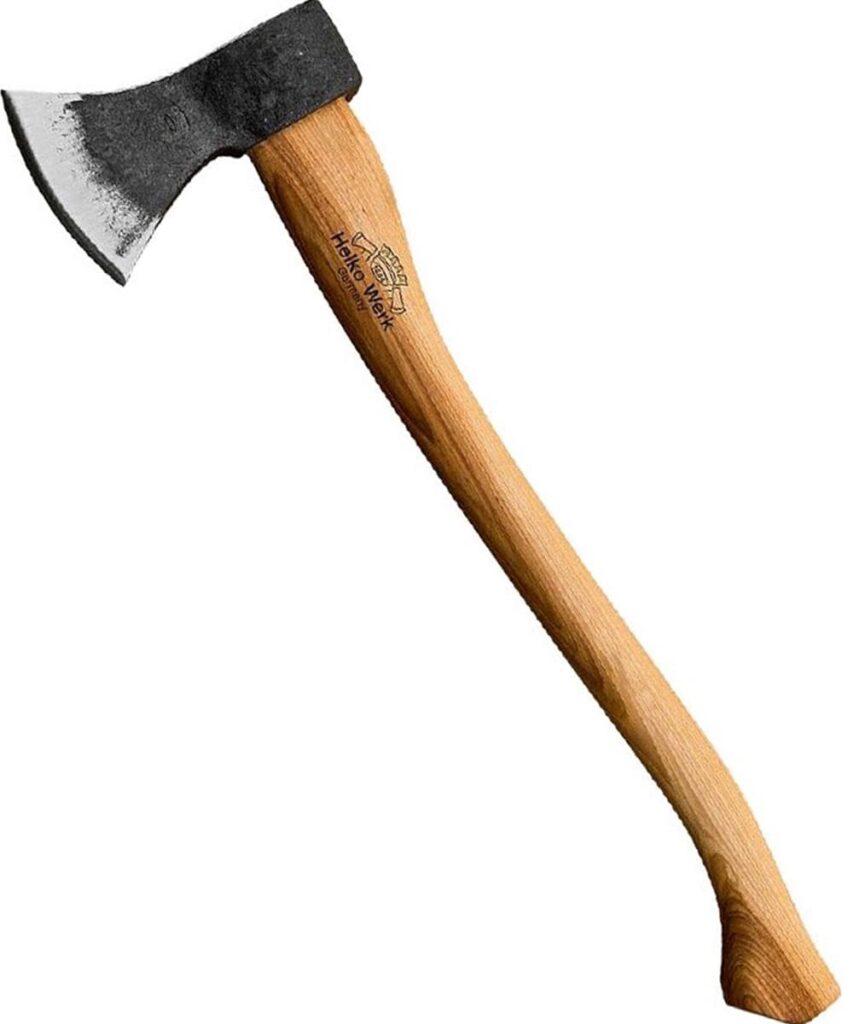
What makes a good bushcraft axe?
Bushcraft axes come in many different shapes and sizes. Each outdoorsman can have different needs for what they’ll be doing in the backwoods – some might only need a small hatchet for making kindling and chopping down young saplings, while others are looking for a more serious axe good for taking down small trees or large branches, splitting lots of wood, a self-defense tool, trail clearing and maintenance work and more. This list will feature:
- Medium-sized axes (traditional wood-handled and composite ones)
- All-metal axes (so that you never have to worry about the axehead coming off the handle)
- Smaller axes/hatchets (in case you want to go as light as possible)
These will be in two price categories: premium and affordable, with a few in the midrange between the two. Some are both inexpensive and good. I don’t really believe in buying cheap tools, but it can’t be denied that Estwing and Gerber (the US subsidiary of Fiskars) both make fine axes for great prices.
What type of axe is best for bushcraft?
The best types of axe for bushcraft are generally called camping hatchets, Hudson bay axes, or boy’s axes. These styles of axe all have shorter handles that give them better carrying attributes with a 2 lb axe head that can perform heavy-duty tasks around the campsite.
What size axe is best for bushcraft?
Bushcraft axes should be 18 to 24 inches in length. This means that they can easily be stored in your backpack or belt loop while still providing enough leverage to apply significant force when striking. This is a balance between the force required for chopping wood or felling trees and the ease of transport and storage.
How heavy should a bushcraft axe be?
Bushcraft axes should be light enough to transport and carry easily but heavy enough to perform all necessary tasks. Ideally, a bushcraft axe should weigh less than 3 lb in total with an axe head of 1.5 to 2.5 lb.
That’s all for now. Thank you very much for reading and I hope this helped you choose a great axe for your bushcrafting trips and needs!
